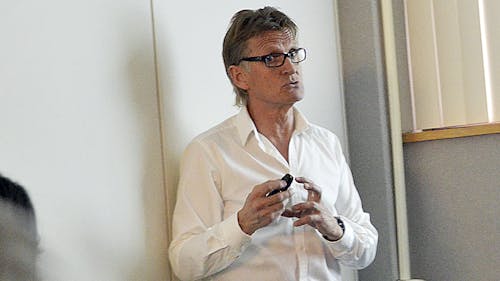Professor shares concerns with current state of Gaza

Through the eyes of Dr. Mads Gilbert, the Israeli siege in Gaza remains unchanged since its bombing three years ago during Operation Cast Lead.
Gilbert, a volunteer doctor during the 2008-2009 Israel-Gaza conflict, spoke at “Gaza, Three Years Later,” last night at the Busch Campus Center, sponsored by BAKA: Students United for Middle Eastern Justice.
While Israeli militants occupied Gaza in 2009, Palestinian civilians were wounded and killed during the Israeli bombings in the Palestinian territory of Gaza, said Gilbert, a professor at the University Hospital of North Norway.
He said hospitals were filled with dead, wounded and screaming people during Operation Cast Lead.
“The children are back into the tents, not because they like camping but because their homes and villages were completely bombed by the Israeli army,” Gilbert said.
The Palestinian territory in Gaza has become a difficult place to live because the Israeli siege has blockaded necessary resources, he said.
There are about 1.6 million Palestinians still imprisoned in Gaza who do not have access to clean drinking water or food, Gilbert said.
Fifty-four percent of Palestinians face food insecurity, and 90 percent of the water is undrinkable, he said.
Because individuals lack food, they have become susceptible to malnutrition and anemia, which reduces access to primary health care, he said.
The siege has also hindered any reconstruction in Gaza, Gilbert said.
“Thirty-nine percent of buildings [are] partly or totally destroyed, [and] 74 percent of bombed building are not repaired,” he said. “There is a lack of reconstruction and normal life,” he said.
Gilbert said the situation in Gaza is difficult to define, but it should not be referred to as a conflict.
“It’s a difficult occupation,” he said.
While Israel has occupied the Palestinian territory in Gaza, Gilbert said there is no logical reason as to why the Palestinians should have to give up their land, which was lost when Israel began occupying the area in the 1940s.
He said an important part of solidarity is not take pity on the victims of the siege. Individuals must see both sides, Gilbert said, not only the suffering but also the capacity to master.
The Israeli surge began because of foreign policy issues that concerned the Israeli government, he said.
He said the Israeli plan was to bomb Gaza, not to control Palestinians but to punish them.
Because Palestine is not a national state, the International Court had ruled that Israel would not be accountable for war crimes, he said.
“Who is held responsible for the killings and mutilations? The answer is nobody,” he said.
Gilbert said solidarity is urgently needed, as Palestinians need support.
“Our government, our universities need to be educated in order to know how to act,” Gilbert said. “You have a great responsibility to try to end this.”
Students can become aware of the situation in Gaza through hearing Palestinian narratives, he said. Individuals who face violence acts and do not speak up are unable to prevent future massacres from occurring.
“Silence makes it part of the oppression and massacre,” he said. “That must not be repeated.”
Israel is not allowing critical supplies into Gaza, he said, which is an attack on the population’s rights.
As a direct result of the siege, children’s growth in Gaza has been stunted because there is a lack of protein, he said
“[They are] actually forced to have this handicap because of the politics of the Israeli government. This is a manmade disaster not a natural disaster,” he said.
Gilbert said he is not sure why the killings are happening, but he is aware of some motives.
“[Israel is] shooting because they say they’re killing terrorists,” he said. “They’re doing targeted killings everywhere. It’s not peaceful in Gaza.”
He said there will not be peace until the occupancy is lifted.
“Gaza will move on with or without [help from] us, they will not give up,” he said.
Nadia Saleh, a School of Arts and Sciences senior, said the situation in Gaza shows what it means to be human.
“I think the medical solidarity is something we really need to think about and be more active in,” she said. “It’s not about access to health care — it’s what leads up to that point.”
Hajar Hasani, BAKA public relations officer, said the club hosted the event to raise awareness about the ongoing human rights abuses in Gaza.
Hasani said images showing victims of the Gaza bombings moved her.
“It’s something you don’t get to see in the American media” said Hasani, a School of Arts and Sciences sophomore. “The situation is still deteriorating, it’s not getting better.”



